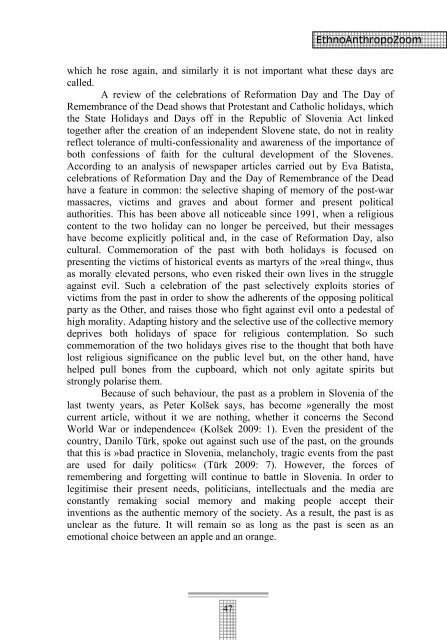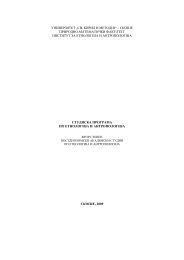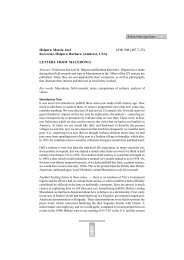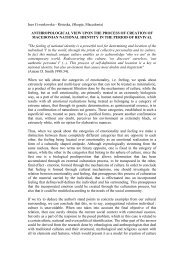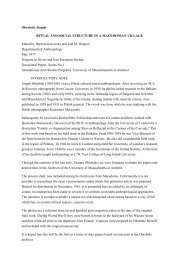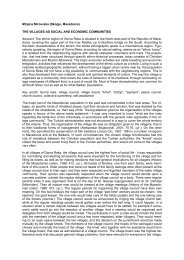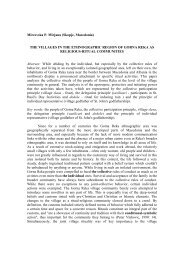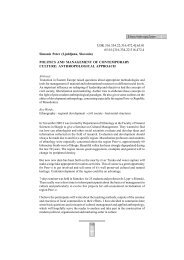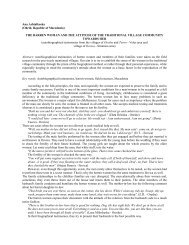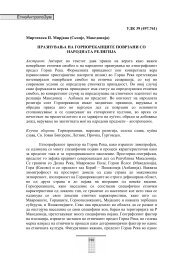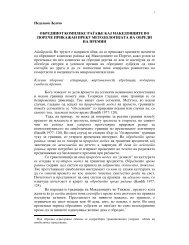Jezernik, Bozidar (Slovenia), The Red and the Black
Jezernik, Bozidar (Slovenia), The Red and the Black
Jezernik, Bozidar (Slovenia), The Red and the Black
You also want an ePaper? Increase the reach of your titles
YUMPU automatically turns print PDFs into web optimized ePapers that Google loves.
EthnoAnthropoZoom<br />
which he rose again, <strong>and</strong> similarly it is not important what <strong>the</strong>se days are<br />
called.<br />
A review of <strong>the</strong> celebrations of Reformation Day <strong>and</strong> <strong>The</strong> Day of<br />
Remembrance of <strong>the</strong> Dead shows that Protestant <strong>and</strong> Catholic holidays, which<br />
<strong>the</strong> State Holidays <strong>and</strong> Days off in <strong>the</strong> Republic of <strong>Slovenia</strong> Act linked<br />
toge<strong>the</strong>r after <strong>the</strong> creation of an independent Slovene state, do not in reality<br />
reflect tolerance of multi-confessionality <strong>and</strong> awareness of <strong>the</strong> importance of<br />
both confessions of faith for <strong>the</strong> cultural development of <strong>the</strong> Slovenes.<br />
According to an analysis of newspaper articles carried out by Eva Batista,<br />
celebrations of Reformation Day <strong>and</strong> <strong>the</strong> Day of Remembrance of <strong>the</strong> Dead<br />
have a feature in common: <strong>the</strong> selective shaping of memory of <strong>the</strong> post-war<br />
massacres, victims <strong>and</strong> graves <strong>and</strong> about former <strong>and</strong> present political<br />
authorities. This has been above all noticeable since 1991, when a religious<br />
content to <strong>the</strong> two holiday can no longer be perceived, but <strong>the</strong>ir messages<br />
have become explicitly political <strong>and</strong>, in <strong>the</strong> case of Reformation Day, also<br />
cultural. Commemoration of <strong>the</strong> past with both holidays is focused on<br />
presenting <strong>the</strong> victims of historical events as martyrs of <strong>the</strong> »real thing«, thus<br />
as morally elevated persons, who even risked <strong>the</strong>ir own lives in <strong>the</strong> struggle<br />
against evil. Such a celebration of <strong>the</strong> past selectively exploits stories of<br />
victims from <strong>the</strong> past in order to show <strong>the</strong> adherents of <strong>the</strong> opposing political<br />
party as <strong>the</strong> O<strong>the</strong>r, <strong>and</strong> raises those who fight against evil onto a pedestal of<br />
high morality. Adapting history <strong>and</strong> <strong>the</strong> selective use of <strong>the</strong> collective memory<br />
deprives both holidays of space for religious contemplation. So such<br />
commemoration of <strong>the</strong> two holidays gives rise to <strong>the</strong> thought that both have<br />
lost religious significance on <strong>the</strong> public level but, on <strong>the</strong> o<strong>the</strong>r h<strong>and</strong>, have<br />
helped pull bones from <strong>the</strong> cupboard, which not only agitate spirits but<br />
strongly polarise <strong>the</strong>m.<br />
Because of such behaviour, <strong>the</strong> past as a problem in <strong>Slovenia</strong> of <strong>the</strong><br />
last twenty years, as Peter Kolšek says, has become »generally <strong>the</strong> most<br />
current article, without it we are nothing, whe<strong>the</strong>r it concerns <strong>the</strong> Second<br />
World War or independence« (Kolšek 2009: 1). Even <strong>the</strong> president of <strong>the</strong><br />
country, Danilo Türk, spoke out against such use of <strong>the</strong> past, on <strong>the</strong> grounds<br />
that this is »bad practice in <strong>Slovenia</strong>, melancholy, tragic events from <strong>the</strong> past<br />
are used for daily politics« (Türk 2009: 7). However, <strong>the</strong> forces of<br />
remembering <strong>and</strong> forgetting will continue to battle in <strong>Slovenia</strong>. In order to<br />
legitimise <strong>the</strong>ir present needs, politicians, intellectuals <strong>and</strong> <strong>the</strong> media are<br />
constantly remaking social memory <strong>and</strong> making people accept <strong>the</strong>ir<br />
inventions as <strong>the</strong> au<strong>the</strong>ntic memory of <strong>the</strong> society. As a result, <strong>the</strong> past is as<br />
unclear as <strong>the</strong> future. It will remain so as long as <strong>the</strong> past is seen as an<br />
emotional choice between an apple <strong>and</strong> an orange.<br />
47


